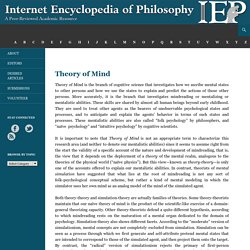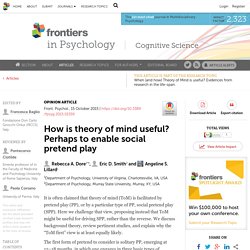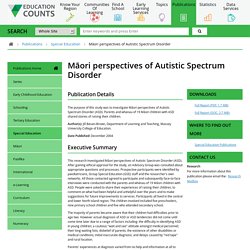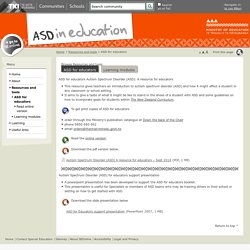

0945 Ray Julie. Autism Social Skills Profile copy. Social Stories - Carol Gray - Social Stories. Autism Internet Modules. Theory of Mind. Theory of Mind is the branch of cognitive science that investigates how we ascribe mental states to other persons and how we use the states to explain and predict the actions of those other persons.

More accurately, it is the branch that investigates mindreading or mentalizing or mentalistic abilities. These skills are shared by almost all human beings beyond early childhood. They are used to treat other agents as the bearers of unobservable psychological states and processes, and to anticipate and explain the agents’ behavior in terms of such states and processes. These mentalistic abilities are also called “folk psychology” by philosophers, and “naïve psychology” and “intuitive psychology” by cognitive scientists. Both theory-theory and simulation-theory are actually families of theories. Table of Contents 1. Social psychologists have investigated mindreading since at least the 1940s. A. B. C. The inside access view comes in various forms. 2.
A. B. 3. Definition. How is theory of mind useful? Perhaps to enable social pretend play. It is often claimed that theory of mind (ToM) is facilitated by pretend play (PP), or by a particular type of PP, social pretend play (SPP).

Here we challenge that view, proposing instead that ToM might be useful for driving SPP, rather than the reverse. We discuss background theory, review pertinent studies, and explain why the “ToM first” view is at least equally likely. The first form of pretend to consider is solitary PP, emerging at 12–18 months, in which one engages in three basic types of transformation: substitutes one object for another, projects imaginary characteristics onto objects, and imagines situations that do not exist (Leslie, 1987). The second form is social pretend play (SPP), which involves the same basic transformations but occurs with others, and emerges around age 3.
We address these two forms of PP consecutively. There is a fundamental similarity, or isomorphism (Leslie, 1987), between PP and ToM. This brings us to the second type of PP, social PP. Theory of Mind: Understanding Others in a Social World. Māori perspectives of Autistic Spectrum Disorder. This research investigated Māori perspectives of Autistic Spectrum Disorder (ASD).

After gaining ethical approval for the study, an Advisory Group was consulted about appropriate questions and processes. Prospective participants were identified by paediatricians, Group Special Education (GSE) staff and the researcher's own networks. All those contacted agreed to participate and subsequently face-to-face interviews were conducted with the parents and whānau of 19 Māori children with ASD. People were asked to share their experiences of raising their children, to comment on what had been helpful and unhelpful over the years and to make suggestions for future improvements to services.
Participants all lived in the central and lower North Island region. The majority of parents became aware that their children had difficulties prior to age two. Parents' experiences at diagnosis varied from no help and information at all to informative explanations and support. Asd maori. The Culture of Autism. And Next Comes L - Hyperlexia & Autism Resources - Accueil. ASD Presentation and Powerpoint for Educators- MOE. Accessibility links Te Kete Ipurangi Navigation: Te Kete Ipurangi Communities Schools Te Kete Ipurangi user options: Navigate in:te reo Māori Close Search community Searching ......

Go to SE Online home page Text sizing: Print this page: Menu Browse Resources and tools: ASD for educators Autism Spectrum Disorder (ASD): A resource for educators This resource gives teachers an introduction to autism spectrum disorder (ASD) and how it might affect a student in any classroom or school setting. To get print copies of ASD for educators order through the Ministry's publication catalogue at Down the back of the Chair phone 0800 660 662 email orders@thechair.minedu.govt.nz Read the online version.
Download the pdf version below. Autism Spectrum Disorder (ASD) A resource for educators – Sept 2016 (PDF, 2 MB) Autism Spectrum Disorder (ASD) for educators support presentation A powerpoint presentation has been developed to support the ASD for educators booklet. Download the slide presentation below. Autism transitions secondary pack (1) ASD Friendly Classrooms Guide [shared]